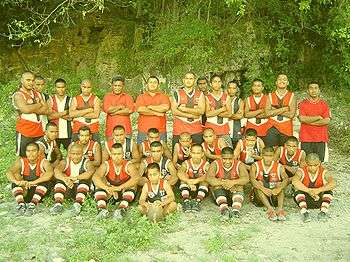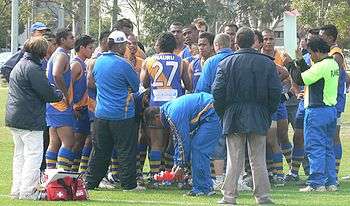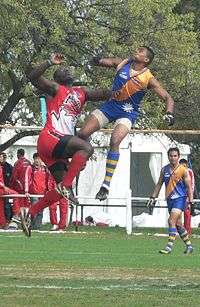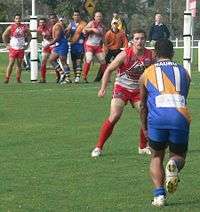Australian rules football in Nauru
Australian rules football in Nauru dates back to the 1930s and quickly established itself, along with weightlifting as the national sport of the country.[1]
| Australian rules football in Nauru | |
|---|---|
 Football being played at the Linkbelt Oval | |
| Country | Nauru |
| Governing body | Nauru Australian Football Association |
| National team(s) | Nauru |
| First played | 1930s |
| Registered players | 680 (total) 180(adult) 500 (junior) |
| Clubs | 12 |
National competitions | |
Nauru Australian Football Association | |
Audience records | |
| Single match | 3,000 (1999). Menaida vs Panzer. NAFA Grand Final. Linkbelt Oval, Aiwo. |
The overall participation rate of over 30% is the highest for the sport in the world.
Structure
The football league system consists of one national league, run by the Nauru Australian Football Association (NAFA), based in the Linkbelt Oval, the country's only active stadium. The surface of the oval is crushed phosphate dust.
An interim Nauru Australian Football League (NAFL) has established after two workshops has been held under the Ministry of Sports led by Honorable Minister for Sports, Justice, & Health Mr Matthew Batsiua MP.
The Interim new Board Executives for NAFL elects Mr Roy Harris, Former Lions full back Player as the new President, football administration elects youth advocator a female to be part of the NAFL, Ann Hubert as Secretary others former interim president of NAFA Mr David Dowiyogo, and other passionate members Fidelis Amwano, Samuel Grundler and Andy Cain are all elected by community groups.
History
Australian rules was first played by Nauruan schoolchildren in the 1930s in schools in Victoria, Australia. Among these schoolkids was Hammer DeRoburt. Schools in Geelong and Melbourne in Victoria were popular destinations of Nauruan schoolchildren of secondary-school age.
After DeRoburt left Australia, he headed back to Nauru with a couple of friends and popularised the sport in his hometown.
Nauru's president Marcus Stephen played for the local Aces team before going on to win multiple medals in Olympic weightlifting which also became a popular sport in Nauru.
In 2006 games in the NAFA final Series was stopped by the Minister for Sports after thugs, hooligans and bullies violated rules of NAFA.
New clubs participating in the competition are BOE Lions, Ace Magpies and Anibare Dockers.
Participation
According to 2007 AFL International Census figures there are around 180 players in the Nauru senior competition and 500 players in the junior competition,[2] representing an overall participation rate of over 30% for the country.
Leagues
Senior league

The senior league is made up of 7 teams, with a reserve league of 5 teams. Only two games per week can take place at the Linkbelt Oval, since as of 2005, the Menen Stadium had yet to be built and the Denig Stadium is not suitable for Australian rules games
Teams in the senior league (Elite):
| Team | Colours | From |
| Menaida Tigers | Yellow and black | Aiwo, Buada |
| Panzer Saints | red-white-black | Meneng |
| Blues | blue-white | Anabar, Anetan, Anebare, Ewa |
| Ubenited Power | white-black | Ubenide |
| Boe Lions | maroon-gold-blue | Boe |
| Aces | Yaren | |
| Supercats | blue-white | Nauru |
Teams in the reserve senior league:
| Team | Colours | From |
| Eagles | Meneng | |
| Ubenited Power | white-black | Ubenide |
| Esso | yellow-black | Aiwo, Buada |
| Yaren Magpies | black-white | Yaren |
| Frigates | Anabar |
Junior League

There are also several levels of junior competition in Nauru, including under 15, under 17 and under 18s.
Audience
The NAFA championship final is an annual event which has in the past attracted up to 3,000 spectators (or 30% of the nation's population).
National team



The Chiefs are Nauru's national team and compete in various national competitions.
Nauru first participated in the 1995 Arafura Games in Darwin, Australia. The team, coached by former VFL/AFL player Mark Yeates finished third, winning the Bronze medal.
In 2000, the Chiefs travelled to Queensland to compete in the inaugural Web Sports Cup to compete against teams from Samoa and the Robina Roos from Australia. The Chiefs won both matches.
In 2001, the Chiefs again travelled to Queensland winning another two matches, one against the Gold Coast Old Boys.
In the same year the Chiefs won the gold medal at the 2001 Arafura Games, defeating the Japanese national side.
At the Australian Football International Cup in 2002, the Chiefs finished in 8th place, ranking Nauru the 9th strongest Aussie Rules nation in the world.
Nauru withdrew from the 2005 International Cup.
They successfully raised the money required to attend the 2008 event, partly through sponsorships. However, due to intense rivalry and violence in the National League, the NAFA placed strict conditions on player eligibility to encourage a sense of unity, meaning that only players under 23 years old with a clean record were able to represent Nauru in the cup. A number of members of the national team were placed with clubs in country Victoria to spend a few months developing their skills before the tournament. The team performed exceptionally, being beaten once in the opening pool round by the eventual winners Papua New Guinea to place 5th overall.
Juniors
Nauru has sent juniors to the Barassi International Australian Football Youth Tournament in 2003, but were defeated by both New Zealand and the ACT junior sides.
Sponsorship
The main sponsors of the NAFA are Capelle & Partner, M & M, OD N Aiwo Hotel, Menen Hotel, Digicel Nuru .
The winning team of the top league is granted a free flight to Australia, courtesy of Our Airline, the second biggest financial supporter of the NAFA.
See also
- Sport in Nauru
- Menen Stadium
References
- "Pacific Sporting Needs Assessment" (PDF). Ausport.gov.au. Archived from the original (PDF) on 3 December 2007. Retrieved 29 July 2016.
- "AFL International Census 2007" (PDF). Afl.com.au\accessdate=2016-07-29. Archived from the original (PDF) on 24 May 2011.
- "Archived copy". Archived from the original on 6 January 2009. Retrieved 24 August 2011.CS1 maint: archived copy as title (link)
- "Archived copy". Archived from the original on 6 January 2009. Retrieved 24 August 2011.CS1 maint: archived copy as title (link)
- "Archived copy". Archived from the original on 4 June 2009. Retrieved 24 August 2011.CS1 maint: archived copy as title (link)
- "Archived copy". Archived from the original on 26 September 2011. Retrieved 24 August 2011.CS1 maint: archived copy as title (link)